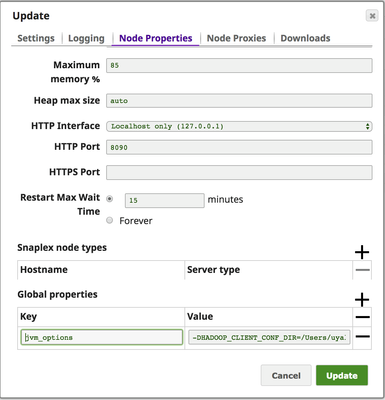In this Page
...
- Before doing the following setups, make sure the Groundplex is working fine.
Install Kerberos packages on the Groundplex nodes.
Code Block $ sudo yum install krb5-workstation krb5-libs krb5-auth-dialog
Copy the file /etc/krb5.conf from one of the target cluster nodes to /etc/krb5.conf on each Groundplex node.
- Install the JCE extension on each Groundplex node.
- Download the JCE extension zip file: http://www.oracle.com/technetwork/java/javase/downloads/jce8-download-2133166.html
Copy the JCE extension zip file onto each Groundplex node and install the JCE extension with the following command. Restart the node after the installation.
Code Block $ unzip -o -j -q jce_policy-8.zip -d /opt/snaplogic/pkgs/jre1.8.0_45/lib/security/
To check if the JCE extension was correctly installed, run the command below and you should see the same output shown as below:
Code Block $ zipgrep CryptoAllPermission /opt/snaplogic/pkgs/jre1.8.0_45/lib/security/local_policy.jar default_local.policy: permission javax.crypto.CryptoAllPermission;
Generate the keytab file for the Kerberos user, put it on each Groundplex node, and give snapuser access to the keytab file.
Code Block $ sudo cp /path/to/keytab/file /home/snapuser/<keytab_file_name> $ sudo chown snapuser:snapuser /home/snapuser/<keytab_file_name> $ sudo chmod 400 /home/snapuser/<keytab_file_name>
To provide additional Hadoop Configuration details to the JCC, it should be passed as a JCC Configuration option. For more details on configuration, please check the Configuration page. The
global.propertiesfile should should be updated to add the following configuration option. Value that jcc.jvm_options points to the HDFS configuration directory.Code Block jcc.jvm_options=-DHADOOP_CLIENT_CONF_DIR=<PATH_TO_HDFS_CONF_DIRECTORY>
for example:
Code Block jcc.jvm_options=-DHADOOP_CLIENT_CONF_DIR=/home/snapuser/remote-hadoop/conf
To provide additional Hadoop Configuration details to the JCC from the UI, edit the Snapplex properties in Manager.
Go to the Snapplex Snaplex Node Properties. Under Global Properties and add a key named "jvm_options" with the value:
Code Block -DHADOOP_CLIENT_CONF_DIR=<PATH_TO_HDFS_CONF_DIRECTORY>
for example:Code Block -DHADOOP_CLIENT_CONF_DIR=/home/snapuser/remote-hadoop/conf
...
| Panel |
|---|
Symptom: The attempt to access Kerberos enabled Hadoop Distributed File System (HDFS) on any cluster host fails with error message "SIMPLE authentication is not enabled" though all Kerberos parameters are configured correctly. Error Message: The following exception is displayed as the error message for the Kerberos authentication enable HDFS Snaps. java.util.concurrent.ExecutionException: java.io.IOException: Cause: All hosts that participate in the Kerberos authentication system must have their internal clocks synchronized within a specified maximum amount of time (known as clock skew). This requirement provides another Kerberos security check. If the clock skew is exceeded between any of the participating hosts, client requests are rejected. Resolution: Maintaining synchronized clocks between the KDCs and Kerberos clients is important, please use the Network Time Protocol (NTP) software to synchronize them. |
| Panel | |||||
|---|---|---|---|---|---|
Symptom: The attempt to access Kerberos enabled Hadoop Distributed File System (HDFS) on any cluster host fails with error message "Server has invalid Kerberos principal:" though all Kerberos parameters are configured correctly. Error Message: The following exception is displayed as the error message. Failed on local exception: java.io.IOException: Cause: When Kerberos Authentication is configured on the HDFS Server, the following properties are added
The special string _HOST in the properties is replaced at run-time by the fully-qualified domain name of the host machine where the daemon is running. This requires that reverse DNS is properly working on all the hosts configured this way. Resolution: One potential cause for this issue is, the "_HOST" has multiple host names and the hostname provided in the "Service Principle" in the Snap Kerberos configuration is not matching with the hostname resolved on the Namenode or DataNode. In the error message, the server's service principle is displayed, please make sure that the same service principle is provided in the Snap Kerberos Configuration. More details can be found at You can use the HadoopDNSResolver tool to verify the DNS Names. Details on the usage of the tool are provided in the same page. |
...
| Panel |
|---|
Symptom:
Error Message: The following exception is displayed as the error message for the Kerberos authentication enable HDFS Writer. java.lang.Thread.State: WAITING Cause: This can be caused by the following reasons.
Resolution: The edge node, on which the Groundplex is executing should be able to access all the standard Hadoop ports. Here is the Hadoop default ports for various distributions. |
